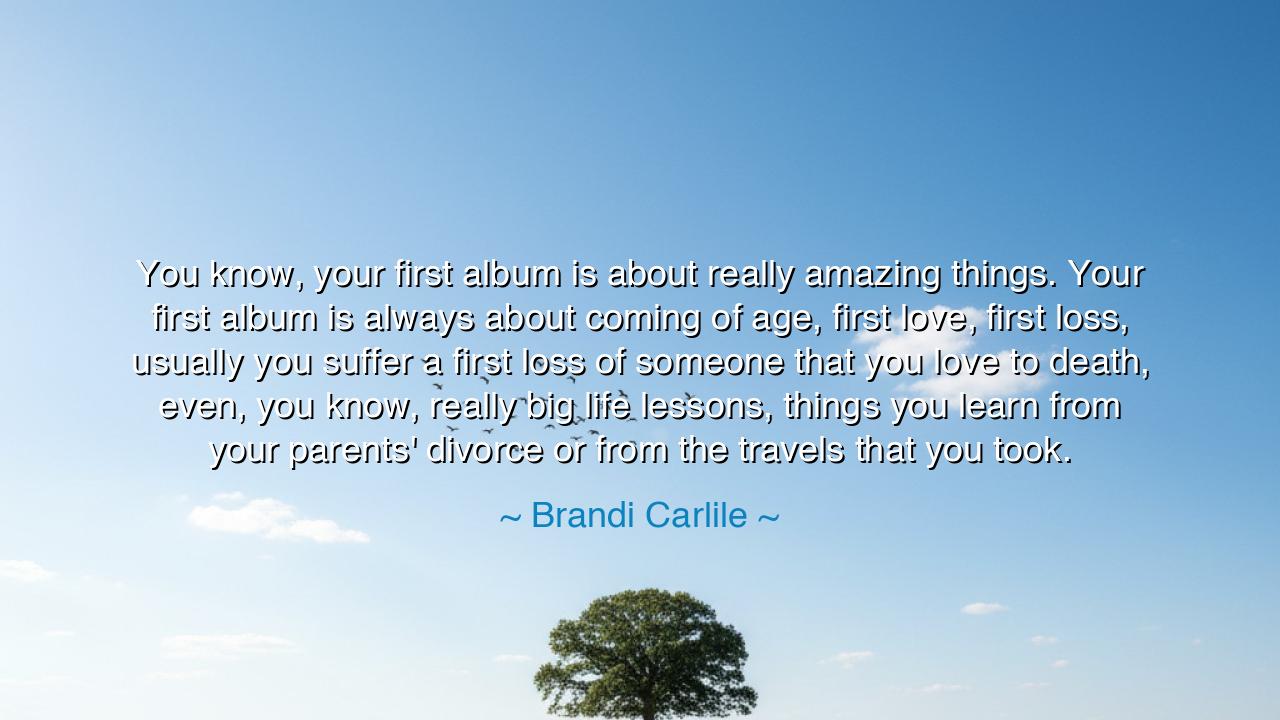
You know, your first album is about really amazing things. Your
You know, your first album is about really amazing things. Your first album is always about coming of age, first love, first loss, usually you suffer a first loss of someone that you love to death, even, you know, really big life lessons, things you learn from your parents' divorce or from the travels that you took.






In the quiet halls of memory, where youth burns bright and unscarred, Brandi Carlile speaks words that echo across generations: “You know, your first album is about really amazing things. Your first album is always about coming of age, first love, first loss, usually you suffer a first loss of someone that you love to death, even, you know, really big life lessons, things you learn from your parents' divorce or from the travels that you took.” These words are not only about music—they are about the soul’s first awakening. The first album is not merely a collection of songs; it is the story of a spirit being born into the great rhythm of existence. It is the moment when one’s heart first learns to translate the ache of living into sound, when the rawness of experience becomes the seed of creation.
For the ancients knew this truth as well: that every human being composes their own first song in the silent chambers of the heart. Before the world hardens them with habit, they live through first love, first loss, and the fragile wonder of seeing life’s vastness for the first time. These early encounters—so bright, so wounding—are the sacred fires that forge the soul. When Carlile speaks of them, she is recalling the ancient music of becoming, the way the young artist confronts the eternal for the first time and shapes it into form. The first album is thus the echo of the first confrontation with reality, where innocence meets truth and something luminous is born.
Consider the tale of Frida Kahlo, whose first paintings came not from ambition but from pain. After a near-fatal accident, as she lay confined to her bed, she began to paint her body, her face, her suffering. That first act of creation—born from loss and awakening—became her life’s path. Her “first album,” so to speak, was not recorded in music, but in color and blood. Like Carlile’s words, Kahlo’s story reminds us that our early art is carved from our earliest confrontations with the real—the moments when we first understand that beauty and sorrow are twins, forever intertwined.
Coming of age, first love, first death—these are not random milestones but rites of passage. They mark the transition from innocence to wisdom. The parents’ divorce, the journey to new lands, the quiet heartbreak—each is a teacher, shaping the melody of who we become. And it is only natural that our first creations overflow with these themes. For they are the foundation stones of consciousness, the first brush with the vast mystery that life truly is. The artist, like the philosopher or the prophet, begins by trying to understand what has already happened to their heart.
Yet there is a kind of heroism in this vulnerability. The first album is not crafted by skill, but by courage—the courage to look at one’s own wounds and make them sing. It is an act of defiance against silence, a declaration that one’s own story matters. Just as the Greek hero Achilles sang of his grief before returning to battle, so too does every artist, every human being, sing their first song to survive their own becoming. What Carlile calls “really amazing things” are not only joys, but revelations—the discovery that life is both fragile and immense.
From this, let us take a lesson for our own time: cherish your firsts, for they are sacred. Whether they come in art, in love, or in pain, they reveal who you are before the world tells you who to be. When life wounds you, let that wound be your teacher. When you love, love with the fullness of the untested heart. When you lose, let that loss carve space for wisdom. Every person, whether musician or not, creates their first album in the form of their earliest choices, words, and memories.
So, O listener, when you find yourself in the quiet of your own becoming, remember this teaching: record it—not merely with instruments, but with awareness. Keep the music of your youth alive in your spirit. Return to it when you forget why you began. For the first album of the soul is never finished; it plays beneath every later creation, a heartbeat reminding us of who we were when we first opened our eyes to the wonder and sorrow of the world.
Thus, the wisdom endures: to live is to sing, and to sing is to remember. Guard the flame of your first song, for it is the truest note you will ever know.






AAdministratorAdministrator
Welcome, honored guests. Please leave a comment, we will respond soon